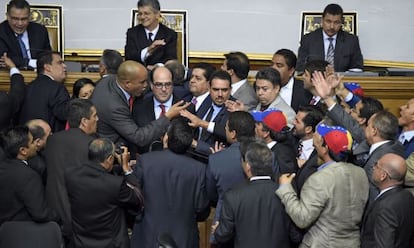Venezuela National Assembly vows to find ways “to change the government”
Speaker of opposition-controlled house sworn in at ceremony attended by independent press

A little before 1.30pm on Tuesday in Caracas, Henry Ramos Allup, leader of the Democratic Action (AD) party, swore himself in as the new speaker of Venezuela’s National Assembly after being voted in by the opposition majority.
Thus began a new political era of unknown dimensions in which a parliament where the opposition holds two thirds of the seats prepares to challenge the weakened government of President Nicolás Maduro.
Allup said that within six months, the assembly would implement a mechanism “to change the government.”
Military personnel and riot units were deployed on the streets of downtown Caracas from early in the morning
Just a few minutes after Allup’s swearing-in session came a first demonstration of the confrontational tone that is likely to dominate the legislative sessions from here onwards. While the rest of the assembly leaders accepted their positions, the chavista sector booed and hurled insults. Ultimately, its members walked out in protest over what they viewed as violations of the assembly’s internal rules.
The official party’s deputies were especially incensed by statements made by the head of the opposition sector, Julio Borges, of the First Justice (PJ) party, who said that the first item on the parliamentary agenda would be the passing of an amnesty and national reconciliation law to benefit the close to 100 political prisoners serving time in Venezuelan penitentiaries. According to the pro-government deputies, such a statement has no place in an inaugural session.
The new speaker was voted in with 109 votes from the opposition’s 112 members in the 167-seat chamber. This underscored the effect of a Supreme Court measure introduced a week ago that suspended the swearing-in of the deputies for Amazonas state after Maduro’s United Socialist Party of Venezuela (PSUV) appealed the outcome of the December 6 elections in three regional districts.
Return of the press
If Tuesday was a day of joy for Venezuelan deputies, the country’s independent press was celebrating as well. For the first time since they were kicked out of the National Assembly five years ago, its reporters were allowed back in.
Chavista deputies, who have been unaccustomed to dealing with uncomfortable questions in recent times, were forced to navigate scores of reporters who expressed their joy by taking pictures and videos of the historic moment. The National Assembly may be the only place of work where it is possible for journalists to obtain replies from chavista spokespeople.
There were over 400 requests for press passes to enter a chamber that the regime gradually closed off to the independent press. The obstacles began in 2008, when TV cameras caught a chavista deputy watching what seemed like pornographic material on his laptop during a session of congress. The deputy later claimed that he was watching a presentation on breast cancer. Cameras were banned from the chamber thereafter.
Despite the tension, parliament was formed on Tuesday. Up until the day before, this formality had been up in the air because of threats of street violence. Both pro-government and opposition forces had called upon their supporters to come out and make a show of force, paving the way for a potential pitched battle on the streets of Caracas.
But just hours before the ceremony, President Maduro asked his followers to allow the National Assembly to be constituted “in calm and peace,” and called upon the armed forces to guarantee law and order. The presidential address deactivated the potential conflict.
The Venezuelan leader also announced that supporters from each camp would have a designated area to march in – west of the Miraflores presidential palace for the chavistas, and east of the National Assembly for the opposition.
“If they want to mobilize, they can do so in peace,” he told opposition protesters, who have been effectively banned from marching in the Libertador area of Caracas since February 2014. “If they want to go out, they can do it within a designated perimeter, with enough space so that access to the assembly is not obstructed, and as long as it is in peace.”
Military personnel and riot units were deployed on the streets of downtown Caracas from early in the morning, with law enforcement agencies setting up three separate barriers leading to the palace that houses the National Assembly. Still, there were a few isolated incidents: reporters from the digital media outlets El Pitazo and La Patilla were assaulted, while chavista supporters set fire to PJ party flags in an area known as La Hoyada.
English version by Susana Urra.
Tu suscripción se está usando en otro dispositivo
¿Quieres añadir otro usuario a tu suscripción?
Si continúas leyendo en este dispositivo, no se podrá leer en el otro.
FlechaTu suscripción se está usando en otro dispositivo y solo puedes acceder a EL PAÍS desde un dispositivo a la vez.
Si quieres compartir tu cuenta, cambia tu suscripción a la modalidad Premium, así podrás añadir otro usuario. Cada uno accederá con su propia cuenta de email, lo que os permitirá personalizar vuestra experiencia en EL PAÍS.
¿Tienes una suscripción de empresa? Accede aquí para contratar más cuentas.
En el caso de no saber quién está usando tu cuenta, te recomendamos cambiar tu contraseña aquí.
Si decides continuar compartiendo tu cuenta, este mensaje se mostrará en tu dispositivo y en el de la otra persona que está usando tu cuenta de forma indefinida, afectando a tu experiencia de lectura. Puedes consultar aquí los términos y condiciones de la suscripción digital.








































